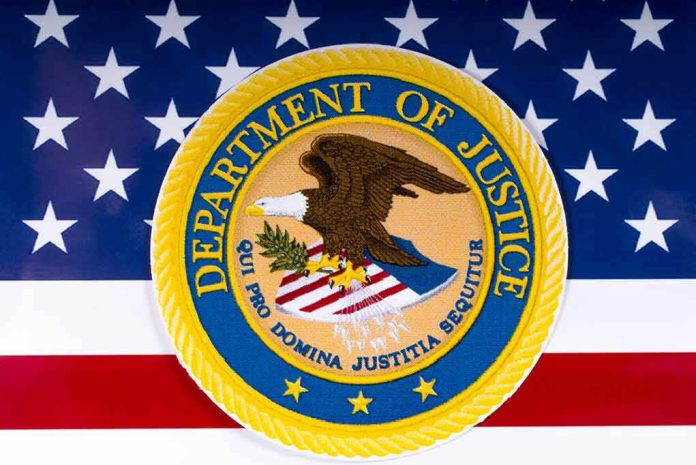
One online post offering a $45,000 bounty for the whereabouts of U.S. Attorney General Pam Bondi detonated a legal and political firestorm, exposing the razor’s edge between digital bravado and federal prosecution in 2025 America.
Story Snapshot
- Federal authorities arrested a man who posted a $45,000 bounty for information on Pam Bondi, the sitting U.S. Attorney General.
- The FBI’s rapid response illustrates the zero-tolerance policy for online threats against public officials.
- The case reignites national debate over how far online speech can go before it becomes a prosecutable crime.
- Legal, political, and tech communities are now scrutinizing the boundaries of digital activism—and its consequences.
Bounty, Bravado, and Federal Law Collide in 2025
Late September, 2025: A digital powder keg is lit when an individual posts a $45,000 bounty online, brazenly seeking information on the current U.S. Attorney General, Pam Bondi. The sum stands out—nearly double the average American’s annual wage—signaling intent or desperation, not mere internet trolling. Bondi, known for her muscular law enforcement stances, has become a lightning rod in a hyper-charged political climate, and the online post does not go unnoticed. Within 48 hours, the post ricochets across social media platforms, sparking alarm in federal law enforcement circles. The FBI, already on high alert for digital threats, swings into action with a speed that brooks no ambiguity about their priorities.
This Guy Thought It Would Be a Good Idea to Post a $45,000 Bounty on Pam Bondi – the FBI Disagreed https://t.co/7BLpztBvSy
— David Wedding (@hdwrench51) October 27, 2025
Agents swiftly identify and locate the suspect, executing a search warrant and arresting him on charges of threatening a federal official. The Justice Department issues a rare, stern warning: “Threats—veiled or explicit—against public officials will be prosecuted to the fullest extent of the law.”
Pam Bondi’s Polarizing Profile: Lightning Rod in a Divided Era
Pam Bondi’s journey to the top of American law enforcement is nothing short of a political saga. A Republican stalwart and former Florida Attorney General, she accepted the post as the 87th U.S. Attorney General in early 2025. Her tenure has been marked by headline-grabbing crackdowns on opioid rings, human trafficking networks, and a relentless push for stricter election laws. These crusades earned her both loyal defenders and passionate detractors, making Bondi a target in the nation’s culture wars and a natural magnet for controversy. In this context, the $45,000 bounty is not merely an aberration but a symptom of deeper societal fissures.
Bondi’s office, in a carefully worded statement, thanks law enforcement for their “swift and decisive action.” The message is clear: neither Bondi nor her team will be cowed by threats, digital or otherwise. For the DOJ and FBI, the case is also a public demonstration of their capacity—and willingness—to defend federal officials, signaling to would-be copycats that online posts can have swift, real-world consequences.
Online Speech on Trial: Where Does Free Expression End?
The case quickly escalates from criminal investigation to a national conversation about the limits of online speech. Legal scholars and civil liberties advocates weigh in, dissecting whether offering a bounty—absent an explicit threat of violence—crosses the line into criminal conduct. Federal law does not require proof of intent to harm; merely soliciting information that could facilitate harassment or intimidation can be enough to trigger prosecution. This precedent alarms some First Amendment purists who caution that redefining “threats” too broadly could chill legitimate dissent and activism.
Cybersecurity experts, meanwhile, argue that the digital age demands proactive monitoring and decisive intervention to prevent threats before they escalate. The FBI’s rapid action in this case is cited as a model for dealing with crowdsourced threats, but critics warn that such responses may also embolden authorities to police speech more aggressively than ever before.
Aftershocks: Security, Policy, and the Shape of Future Debates
Pam Bondi now enjoys increased security, and the episode triggers a wave of “threat audits” for other high-profile federal officials. The DOJ and FBI begin reviewing whether additional guidelines—or even new laws—are needed to address bounties and threats posted online. Social media companies, caught in the crossfire, face renewed pressure to improve monitoring and compliance with law enforcement requests, even as privacy advocates raise alarms about surveillance overreach.
For the accused, the case is pending, but the message from Washington is unmistakable: digital activism that targets public officials can swiftly turn into a federal case. For everyone watching—officials, activists, and ordinary citizens—the boundaries of online speech, privacy, and public safety are being redrawn in real time, with profound implications for the country’s political discourse and the tech platforms that now mediate it.
Sources:
United States Department of Justice



